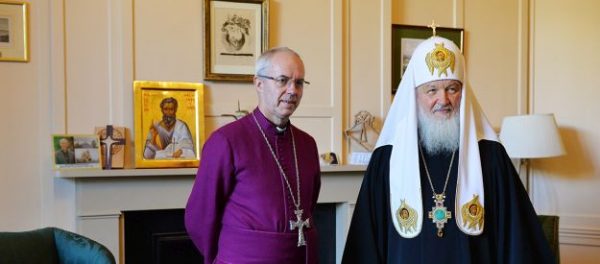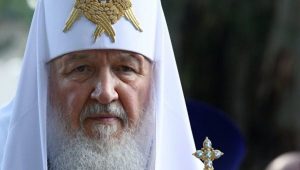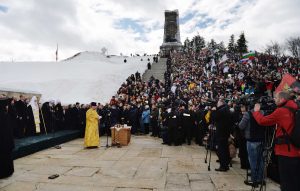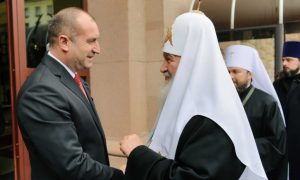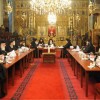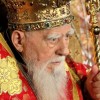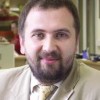For more than a decade already, official relations between Russia and the United Kingdom have vacillated between very bad and not so bad, and the long-planned visit by Patriarch Kirill of the Russian Orthodox Church over the past four days occurred during a very bad moment, even by post-Crimea standards.
Just days before, Foreign Secretary Boris Johnson went as far as calling for rallies outside the Russian Embassy protesting against “atrocities” in Syria. The British cabinet is considering new sanctions against Russia. The Royal Navy is on alert as Russian ships pass by. And the accounts of the state-sponsored RT television network are under threat of being frozen.
Against this backdrop, Patriarch Kirill, who, despite the constitutional separation of church and state, enjoys an exceptionally high status in the official Russian hierarchy, made a busy four-day visit to London. Its official purpose was to mark the 300thanniversary of the Russian Orthodox presence in the British Isles, which dates back to the embassy church set up by Peter the Great. The goal was also to re-consecrate, after a massive and expensive renovation, the Russian Orthodox Dormition Cathedral in Kensington – the seat of the Moscow Patriarchate’s Diocese of Sourozh.
But he also had a private audience with Queen Elizabeth and a formal meeting with the Archbishop of Canterbury, Justin Welby. He also conferred a high Russian Orthodox award on Richard Chartres, the Bishop of London, and gave a press conference clarifying his position on the war in Syria, which he had reportedly described as a “holy war.”
The historical context of the visit
It was not the first visit by the Patriarch of Moscow to the UK. But even taking into account the long history of the relationship between the Russian Church and the Church of England dating back to the 19th century, when two non-Roman episcopal imperial churches established a dialogue, they are certainly special occasions.
The first such visit took place in 1964, when Patriarch Alexy I came to London at the invitation of the Archbishop of Canterbury, Michael Ramsey. Patriarch Alexy II visited in 1993. Kirill came to London many times in his previous capacity as the head of the Moscow Patriarchate’s Department of External Church Relations.
Thus, the current visit, the first since he was elected patriarch in 2009, clearly had a personal resonance for him. He recalled the earlier trips in his speeches, made an 8-kilometer stroll through the city, leafed through used books at second-hand book stalls near Waterloo and gladly received a Welsh Corgi dog as a present – all these episodes meticulously posted by his entourage on social networks. One moment hard to be seen as a pure coincidence was the visit to the Royal Geographical Society, which was obstructed by a fire drill. As a result, the ceremony of handing Kirill his membership certificate had to take place as an open-air event.
Ambiguities of the Patriarch’s role
The Patriarch’s position in the Russian system as an official who is not formally part of the Kremlin yet certainly in close contact with Russian President Vladimir Putin, has resulted in a number of ambiguities. On the one hand, this uncertainty over his role has generated criticism of the red carpet rolled out to him in London. On the other hand, it has served as an asset for Russian-British relations at the current difficult moment.
By contrast, President Putin was to inaugurate on Oct. 19 the newly built Russian cultural center and church in Paris, but that visit was cancelled due to tension over Russia’s Syria policy. The opening ceremony went ahead, although it was downgraded to the level of culture minister.
The Patriarch’s visit to London also met with criticism. Ukraine’s Ambassador to London, Natalia Golibarenko, decried the reception in the Buckingham Palace for the “former KGB agent” whom she accused of supporting Russia’s “aggression” in Ukraine, The Times reported. Labour MP John Woodcock told the media that he found the warm reception for the patriarch “very troubling” given Russia’s support for the “murderous” Syrian regime. Another Labour MP, Alison McGovern, said it would offer a “PR opportunity” for a “Putin ally.” Yet it did go ahead as planned.
The diplomatic role of the Orthodox Church
“I understand that no visits by the Patriarch can smooth over the contradictions that exist today. But I considered that it is necessary to visit the Great Britain to mark the 300th anniversary of our parish disregarding what is the political context in the relations between our two countries – to pray together with our Orthodox people and to communicate with the Britons,” the patriarch said at his press conference at the London airport on Oct. 18. He said he met with people who were “no particular friends of Russia,” yet did not feel any hostility, but only “warmth and a kind atmosphere.”
He made another important hint in a speech in the Dormition Cathedral on Oct. 16 when he recalled an episode when, in the 18th century, diplomatic relations between St. Petersburg and London were broken off and the Orthodox priests stationed in London performed the diplomatic duties.
“It happened every time when the interstate relations were complicated: The Churches of Russia and Britain were the bridge that connected our two peoples,” he said.
That approach was shared by many on the British side too. Paul Bickley, director of the political program at Theos, a Christian think tank in London that deals with social and political issues, said in a telephone interview that while the atmosphere of the visit was characterized by “anxiety,” many saw it as a “useful way to keep the conversation going.”
“While the political channels are clearly clogged up and relationships between London and Moscow on the political level are frosty, it was a good way to keep the friendly diplomatic relations on another level. There is a spiritual and cultural relationship even where the political relationship is frosty,” Bickley told Russia Direct.
He also noted that the meeting with the Queen – although it was carried out in her capacity as the Supreme Governor of the Church of England – could not have taken place without the consent of the Cabinet. “The Queen and the Prime Minister have to work hand in glove, of course, in a constitutional monarchy,” he said.
Religious issues
There are also some rather dramatic and purely religious matters that Patriarch Kirill’s visit brought attention to.
One is the internal development of the Russian Orthodox Church in Great Britain. The Diocese of Sourozh in the United Kingdom was founded by an epic figure in 20th century Russian Church history – Metropolitan Anthony Bloom. Born in Switzerland to a family of a Russian diplomat of Scottish origin, he was a doctor in the French Resistance during World War II until moving, as a monk and priest to London, where he came to lead a unique community combining Russian tradition with openness to present-day European realities. His brand of Orthodoxy not only appealed to many Brits who joined his church, but had a following among Russian Orthodox intellectuals back in Russia.
Yet around the time of his death in 2003, which was also the time of massive new immigration from the Soviet Union, the community became divided largely along the lines of “old-timers” and “newcomers” and a number of Metropolitan Anthony’s followers eventually left for the Patriarchate of Constantinople, while the Diocese of Sourozh under the current leadership of Archbishop Elisey Ganaba was increasingly conforming with the standard practices of the Moscow Patriarchate. At some point, even the ownership of the cathedral itself was contested in the court of law. The refurbishment and re-consecration of the cathedral is thus seen within the church as the ultimate victory of Moscow and the newer trend in the overall style of the community.
There is a separate drama in the relationship between the Russian Orthodox Church and the Anglican Church. A century ago, these were seen as the world’s closest large Christian bodies. Yet, in the past years, Moscow broke off theological dialogue with the Church of England over a combination of social, anthropological and ecclesiological issues that divide Christian conservatives and Christian liberals.
The Russian Orthodox Church vocally protests against ordination of women, blessing of gay unions and acceptance of openly gay clergy as well as the use of inclusive language in liturgy and the new translations of the Bible – all issues in which the Church of England has seen itself at the forefront of progress in the past decades.
The true meaning of a “holy war”
Yet, leaving London, the patriarch emphasized the positive. He said his conversation with Archbishop Welby was “very useful” and the two churches have a common vision of their role in conflicts. “A whole program of joint actions has been outlined, and we are set to work together in the field of peace making, taking into account various hot spots on the planet, where confrontation takes place,” the patriarch said.
When it came to Syria, however, the discussion became complicated and it was hard for the sides to understand each other. As proof of the visit’s role in the diplomatic dialogue between Moscow and London, the chairman of the Moscow Patriarchate’s Department of External Church Relations, Metropolitan Hilarion Alfeev, met during the visit with the Baroness Joyce Anelay, minister of state for the Commonwealth and the UN at the Foreign and Commonwealth Office. Britain’s ambassador to Russia, Laurie Bristow, took part.
The issue discussed was reportedly the fate of Christians in the Middle East – a topic embraced by the Moscow Patriarchate in recent years. Yet Anelay told later The Christian Today that she “made it clear that Assad is the cause of the problem and not the result and that he has not made any attempt to protect minorities.” She added: “Assad and his allies, which include Russia, have not provided and cannot provide protection for minorities.”
During his final press conference, the BBC asked the patriarch what he meant by the “holy war” in Syria. He said he was misunderstood.
“I have never spoken about a holy war in Syria – I spoke about the holy war against terrorism. And I think that these words of mine can be joined by many victims of terrorism in Europe,” he said.
He went on to recall how the war against Nazi Germany was seen in the Soviet Union as a “holy war” and made a parallel to the fight against terrorism, which needs to be a joint one.
“It is not a cause for Russia only, it is a cause for all countries. We have to join our ranks to overcome this evil. This is the war I call holy,” he said.
Such language is unlikely to find many supporters in Britain, said Samuel Greene, director of the Russian Institute at King’s College London. “The talk of a holy war would resonate only with a small part of the British population,” he told Russia Direct. Yet he agreed that overall the visit signifies openness to a dialogue between British and Russian societies at a time when the official lines of communication are tense.
“A meeting between the Queen and the Patriarch is not something that could happen in a country that was captured by Russophobia. Certainly there is an openness on the policy level and on the public level to a dialogue with Russia even when the dialogue with the Kremlin itself seems very difficult,” he said.












